
Austral Entomology
Scope & Guideline
Advancing Knowledge in Insect Ecology and Agronomy
Introduction
Aims and Scopes
- Taxonomy and Systematics:
A core area of the journal is the taxonomic and systematic study of insects, including the description of new species and genera, revisions of existing taxa, and phylogenetic analyses. This focus helps in understanding biodiversity and the evolutionary relationships among insect groups. - Ecology and Behavior:
The journal publishes research examining the ecological roles and behaviors of insects, including their interactions with other organisms and environmental factors. Studies on population dynamics, community assemblages, and behavioral ecology are significant components. - Applied Entomology and Pest Management:
Research addressing practical applications of entomology, particularly in pest management and agricultural contexts, is a prominent theme. This includes studies on insect pests, resistance management, biological control, and the impact of environmental changes on pest populations. - Conservation and Biodiversity:
The journal emphasizes the conservation of insect species and their habitats, highlighting the importance of insects in ecosystems. Research on the conservation status of various insect groups, as well as strategies for their conservation, is frequently published. - Insect Physiology and Genetics:
Studies focusing on the physiological and genetic aspects of insects, including insecticide resistance mechanisms, reproductive biology, and genetic diversity, are essential for understanding insect biology and improving pest management strategies.
Trending and Emerging
- Insect Responses to Climate Change:
Research examining how insect populations respond to climate change, including studies on drought effects, temperature influences on life cycles, and habitat shifts, is increasingly prominent. This trend highlights the urgency of understanding climate impacts on biodiversity. - Molecular Techniques in Entomology:
There is a growing trend towards utilizing molecular techniques, such as DNA barcoding and phylogenomic analyses, to enhance taxonomic resolution and understand genetic diversity within insect populations. This shift reflects advancements in technology and the need for precise identification. - Insect-Plant Interactions and Agricultural Impacts:
Studies exploring insect-plant interactions, particularly in agricultural settings, are on the rise. Research on pollinators, pest interactions with crops, and the ecological roles of insects in agriculture underscores the importance of these relationships for sustainable farming practices. - Invasive Species Research:
An increasing focus on the impacts of invasive insect species and their management strategies is evident. This includes studies on the ecological consequences of invasions and the development of biological control measures. - Conservation Genetics and Biodiversity Monitoring:
Emerging themes include the use of genetic tools for monitoring insect populations and assessing biodiversity, reflecting a broader interest in conservation strategies and the need for data-driven approaches to protect insect diversity.
Declining or Waning
- Traditional Biodiversity Surveys:
Research that primarily focuses on traditional biodiversity surveys, such as species inventory studies without ecological context, seems to be declining. There is a shift towards more integrative studies that combine taxonomy with ecological and behavioral insights. - Historical Taxonomy without Molecular Techniques:
Taxonomic studies that rely solely on morphological characteristics without incorporating molecular techniques appear to be less frequent. The increasing emphasis on molecular phylogenetics and DNA barcoding suggests a waning interest in purely morphological taxonomic approaches. - General Insect Behavior Studies:
Publications focusing on generic descriptions of insect behavior without specific ecological or evolutionary implications are becoming less common. There is a trend towards research that links behavior to ecological dynamics or pest management outcomes.
Similar Journals

APPLIED ENTOMOLOGY AND ZOOLOGY
Championing the study of insects for ecological balance.Applied Entomology and Zoology, published by Springer Japan KK, is a pivotal journal in the field of insect science, with an impressive track record since its inception in 1966. This esteemed publication, bearing ISSN 0003-6862 and E-ISSN 1347-605X, contributes significantly to the understanding of applied entomology, emphasizing research that supports sustainable agricultural practices and the ecological conservation of insects. Ranked in the Q2 category (2023) for Insect Science with a Scopus rank of #65 out of 181, it is recognized for its rigorous peer-review process and high-quality contributions that push the boundaries of our knowledge. Although it does not currently offer open access, the journal remains an essential resource for researchers, professionals, and students eager to advance their understanding of the complex interactions between insects and their environment. With a focus on practical applications, it aims to bridge the gap between entomological research and real-world implications, fostering innovation and promoting informed decision-making within the scientific community.

REVISTA DE LA SOCIEDAD ENTOMOLOGICA ARGENTINA
Connecting Minds in Entomology and EcologyREVISTA DE LA SOCIEDAD ENTOMOLOGICA ARGENTINA is an esteemed open-access journal dedicated to the field of entomology, published by the SOCIEDAD ENTOMOLOGICA ARGENTINA. Since its transition to open access in 2013, the journal has sought to promote research in insect science, ecology, and related disciplines, facilitating global dissemination of knowledge and encouraging collaborative studies across borders. Located in the vibrant scientific landscape of La Plata, Argentina, the journal is indexed in Scopus and categorized in the fourth quartile of ecology and insect science, reflecting its commitment to enhancing the discourse within these critical fields. Aiming to bridge the gap between researchers, students, and professionals, REVISTA DE LA SOCIEDAD ENTOMOLOGICA ARGENTINA serves as a platform for innovative research, reviews, and reports on ecological interactions, behavior, and systematic entomology, ultimately driving forward our understanding of insect biodiversity and its broader environmental impacts.
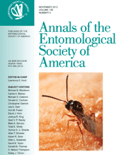
ANNALS OF THE ENTOMOLOGICAL SOCIETY OF AMERICA
Transforming Entomological Research Since 1938ANNALS OF THE ENTOMOLOGICAL SOCIETY OF AMERICA is a premier journal dedicated to advancing the field of insect science, published by Oxford University Press. With an impressive impact factor and classified in the Q1 quartile for its category, this journal ranks among the top publications in agricultural and biological sciences, specifically within insect science, positioned at #28 out of 181, indicating its significant influence and high-quality research contributions. The journal aims to disseminate original research, comprehensive reviews, and groundbreaking findings that enhance our understanding of entomology, spanning across ecological, evolutionary, and applied segments. With a consistent publication history since 1938, researchers, professionals, and students will benefit from the wealth of knowledge presented in its pages. Although the journal does not currently offer open access, it remains a vital resource for those seeking to stay at the forefront of entomological research and innovation.
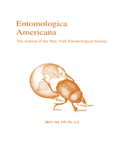
Entomologica Americana
Connecting Researchers in the World of InsectsEntomologica Americana is a pivotal journal in the field of Insect Science, published by the esteemed New York Entomological Society Inc. With its ISSN (1947-5136) and E-ISSN (1947-5144), this journal serves as a critical resource for researchers, professionals, and students dedicated to the study of entomology. Although it is categorized in the Q4 quartile for Insect Science as per the 2023 Scopus Rankings, where it ranks 179 out of 181, it continues to provide valuable insights into various aspects of insect biology, ecology, and conservation. The journal has been actively publishing since its convergence years from 2009 to 2017, and in selected years thereafter, including 2019, 2021, and 2023. Located at the iconic American Museum of Natural History in New York City, Entomologica Americana is a testament to the ongoing exploration and understanding of the insect world that underpins biodiversity and ecosystem health. Although it does not operate under an Open Access model, it offers a vital platform for scholarly communication and the dissemination of research findings, making it indispensable for anyone involved in or entering the fascinating field of entomology.

INSECT SYSTEMATICS & EVOLUTION
Connecting Scholars in the World of InsectsINSECT SYSTEMATICS & EVOLUTION is a prestigious journal published by BRILL, which has been a vital source of scholarly information since its inception. Specializing in the fields of ecology, evolution, behavior, and systematics within the realm of insect science, this journal garners significant attention with its 2023 ranking in the second quartile across multiple categories, highlighting its relevance and impact in the field. With a focus on advancing knowledge through innovative research and reviews, it serves as an essential platform for researchers, professionals, and students alike, promoting an understanding of insect biodiversity and systematics. The journal’s accessibility options, including its Open Access policy, combined with a broad international scope, ensure that critical findings reach a diverse audience, fostering collaboration and discourse within the scientific community. Situated in the Netherlands, INSECT SYSTEMATICS & EVOLUTION maintains its commitment to excellence and strives to contribute actively to the ongoing dialogue in insect science, making it a must-read for anyone interested in the intricate world of insects.

Annual Review of Entomology
Synthesizing Expertise for Future DiscoveriesAnnual Review of Entomology, published by Annual Reviews, is a premier journal dedicated to advancing the understanding of entomology through comprehensive review articles from leaders in the field. With a focus on Ecology, Evolution, Behavior, and Systematics and Insect Science, the journal ranks in the top quartile (Q1) as of 2023, reflecting its significant impact and relevance in these disciplines. Based in the United States, the Annual Review of Entomology has been a trusted resource since its inception, providing critical insights that inform research, policy, and education in entomology. Researchers and professionals will find valuable reviews that synthesize current knowledge and highlight future directions in insect research. The journal's impressive standing, as indicated by its rankings—first in both Agricultural and Biological Sciences categories—emphasizes its pivotal role in shaping scientific discourse and innovation.
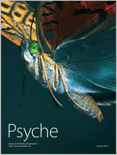
Psyche-A Journal of Entomology
Connecting the Dots in Insect DiversityPsyche-A Journal of Entomology is a distinguished open-access journal published by Hindawi Ltd, specializing in the field of entomology, including aspects of ecology, evolution, behavior, and systematics of insects. Established in 1874, this journal has a rich history of contributing to the scientific community by disseminating high-quality research related to insects and their diverse interactions within ecosystems. With an impact factor placing it in Q3 for both Ecology, Evolution, Behavior and Systematics and Insect Science, Psyche serves as a pivotal platform for researchers, professionals, and students aiming to deepen their understanding of insect-related science. The journal's commitment to open access ensures that research is accessible to a global audience, promoting collaboration and innovation in entomological studies. Covering a broad timeline of converged years from 1874 to 2024, Psyche fosters a comprehensive dialogue around insect biodiversity, conservation, and the ever-evolving dynamics of ecosystems in which insects play crucial roles.
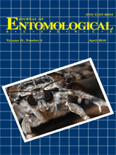
JOURNAL OF ENTOMOLOGICAL SCIENCE
Your Gateway to Cutting-Edge Insect StudiesJOURNAL OF ENTOMOLOGICAL SCIENCE, published by the Georgia Entomological Society Inc, is a crucial resource in the field of insect science and ecology. With a rich history since its inception in 1993, the journal provides a platform for innovative research and comprehensive reviews addressing various aspects of entomology. Although not an open-access journal, it is highly regarded within its community, holding a Q3 ranking in Agronomy and Crop Science, Ecology, Evolution, Behavior and Systematics, and Insect Science as of 2023. Each issue promises to contribute valuable insights to professionals, researchers, and students alike, making it an essential publication for those looking to stay abreast of developments in entomological studies. The journal's editorial commitment ensures that it remains at the forefront of entomological research through rigorous peer reviews and a dedication to scholarly excellence.
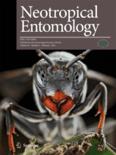
NEOTROPICAL ENTOMOLOGY
Celebrating the Ecological Wonders of Insect LifeNEOTROPICAL ENTOMOLOGY, published by the Entomological Society of Brazil, is a leading journal in the field of Insect Science, recognized for its significant contributions to the understanding of entomological research within the Neotropical region. With an impact factor placing it in the Q2 category and ranked #52 out of 181 in the Scopus rankings for Agricultural and Biological Sciences, this journal provides a vital platform for both seasoned researchers and emerging scholars to publish their innovative findings. Covering a broad scope of topics related to entomology, NEOTROPICAL ENTOMOLOGY aims to highlight the unique biodiversity and ecological significance of insects, fostering further appreciation and study within this crucial area of life sciences. The journal is available in both print (ISSN: 1519-566X) and online (E-ISSN: 1678-8052), ensuring accessibility to a wide audience and enhancing the dissemination of knowledge. As it converges towards its 2024 volume, the journal remains committed to advancing the scientific understanding of insect life in the tropics, making it an essential resource for researchers, professionals, and students alike.
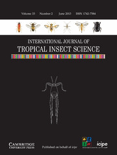
INTERNATIONAL JOURNAL OF TROPICAL INSECT SCIENCE
Fostering Dialogue in Insect Biology and EcologyINTERNATIONAL JOURNAL OF TROPICAL INSECT SCIENCE, published by Springer International Publishing AG, is a leading interdisciplinary journal dedicated to advancing knowledge in the fields of insect science and ecology. With its ISSN 1742-7584 and E-ISSN 1742-7592, this journal provides a platform for researchers to publish high-quality, peer-reviewed articles that explore various aspects of tropical insect biology, behavior, and their ecological impacts. As evidenced by its Q3 ranking in both Ecology, Evolution, Behavior and Systematics and Insect Science, it plays a vital role in fostering scientific dialogue and innovation within these disciplines. Researchers affiliated with the journal benefit from its visibility and growing impact, as demonstrated by its Scopus ranks, with a percentile standing of 61st in Insect Science. Although the journal is not open access, it still reaches a wide academic audience, making significant contributions to our understanding of tropical ecosystems. Situated in Switzerland, this journal is crucial for students, professionals, and researchers invested in the intersection of entomology and ecological science.